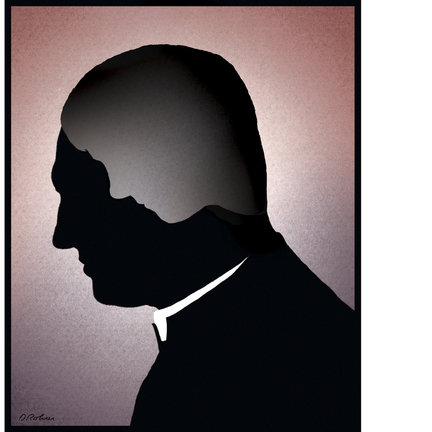By Frank Fromherz
The Oregonian
April 10, 2010
http://www.oregonlive.com/opinion/index.ssf/2010/04/catholicism_in_crisis_opens_an.html
 |
A rapidly escalating credibility crisis faces Pope Benedict XVI and many who have come to his defense. The litany of injustices perpetrated on minors, compounded by secrecy, haunts the papacy itself. Here in the Pacific Northwest, Portland Archbishop John Vlazny, during Holy Week, joined the campaign of hierarchical defensiveness. He chastised the editors of The Oregonian for "an insulting and unfair attack" and denounced an editorial cartoon -- a depiction of Benedict as deaf to public demands -- as "a portrayal dripping with hostility."
Though he canceled his subscription to The Oregonian and asked priests and pastoral ministers to do likewise, I would respectfully ask the archbishop and especially the pope a question: What could you do to turn a profound crisis of authority into an opportunity for courageous leadership?
But first, a few words about the responsibility we have as constructive critics. Mean-spirited attacks are not helpful. Nor is it right to let the behavior of some people within a faith tradition lead us to stereotyping all priests or other religious figures. Moreover, the serious problem and crime of pedophilia is certainly not confined to the church.
Yet, a serious and perhaps systemic pedophilia problem plagues the church. The courage of victims, the diligent work of lawyers, the reparative impact of lawsuits and the tenacity of investigative journalism have brought to light the sad stories of child molestation. In Oregon, or in the especially troubling story of what happened to deaf children in Wisconsin, or in Ireland, or all across Europe, or in the pope's native Germany and in the Bavarian region where he was an archbishop years ago, patterns of priestly abuse of minors and decadeslong avoidance have told a baleful tale.
To be sure, many church leaders have taken conscientious action to right the wrongs. Here in Oregon, we have seen the instituting of a firm policy to stop abuse. Few fair-minded observers would argue, however, that these considerable improvements in church conduct would likely have happened without the aforementioned pressures.
So what can be done now?
These suggestions are offered in a spirit of genuine concern for the people who are most deeply affected by the crisis -- the victims of child sexual molestation. After having lived through the nightmare, they are now inflicted with yet another manifestation of ecclesiastical incredibility -- the use of the Passion Narrative of the suffering and death of Jesus Christ to evoke compassion for Pope Benedict himself. One church prelate very recently implied that the pope is undergoing a profound victimization, a sort of crucifixion via the media and relentless public scrutiny about his past behavior. But by any plausible stretch of the imagination the pope is not the victim. He may be receiving some unjustified caricatures, but nothing compared to what has happened to all who have been traumatized by criminal behavior.
The whole community of Roman Catholics around the world could be played for fools here. I doubt, however, that many of them will be willing to take the most profound of their faith narratives and allow the focus of the story to shift away from those who are, in this case, the true crucified ones -- those who have been led through a scourging at the pillar of pedophilia, led weeping among the many stations of the cross.
I remember doing the meditations of the Stations of the Cross during Lent as a child raised in a Catholic household. I have lately been imagining that the story at the heart of the ritual is first and foremost a story of significance for those who have suffered as victims of sexual abuse. In a "circle the wagons" campaign to defend the Holy Father, a few in the highest echelons have forgotten to be a genuine community of memory, one that has the courage and capacity to remember not only suffering endured but suffering inflicted.
Neither Pope Benedict nor most of the prelates, including Archbishop Vlazny and Cardinal William Levada, the current head of the Congregation for the Doctrine of the Faith, have the intention of using the Passion Narrative of Jesus Christ as if it applies only to what the pope is undergoing. They care deeply about the victims of child sexual abuse and they want to find a way forward for all. Many church leaders have expressed profound shame and sorrow. But the tendency, especially now when the papacy itself is under such intense scrutiny, has been to shift into patterns of defensiveness. Benedict's lack of full candor is not helping. All of this only clouds the message, exacerbates the crisis and misses the opportunity.
We all make mistakes and it is our common humanity we must keep in mind when considering what we can learn from this. The example of Anglican Archbishop Desmond Tutu and the Truth and Reconciliation Commission in South Africa could offer guidance. Perpetrators of injustice were challenged to come forth with the full story. Tutu guided a process so that the people of his country could move forward through full public confession, accountability and reconciliation. Pope Benedict could do the same.
Archbishop Vlazny has described Pope Benedict XVI as "our high priest, our universal pastor, our faithful teacher, the one person who, in the eyes of the world, symbolizes all that we are and do as Catholics." If this is so, then Pope Benedict XVI can best be the faithful teacher in the eyes of the world by telling the world what he knew, when he knew it and what he did about it. Most significantly, with the whole truth told, he could then credibly and forthrightly tell us what he is going to do about it now.
On the home front? Archbishop Vlazny, instead of canceling that subscription, could focus energy on canceling the defensive conduct. It just gets in the way of the true story.
Any original material on these pages is copyright © BishopAccountability.org 2004. Reproduce freely with attribution.